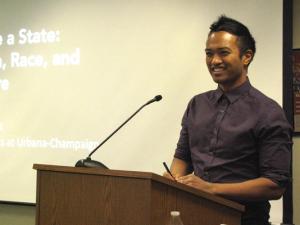Colonialism, Race, and Sexualities Initiative (CRSI)
Image

- Larry La Fountain Stokes (American Culture, Romance Languages and Literatures)
- Charlotte Karem Albrecht (Women's Studies, American Culture)
- Reginald Jackson (Asian Languages and Culture)

The Colonialism, Race, and Sexualities Initiative (CRSI) seeks to develop forums and dialogue produced at the junction of postcolonial, empire, comparative ethnic, critical race, gender, and sexuality studies. Highly innovative scholarship, cultural production, and activism have attended closely to how formations of race, class, colonialism, gender normativity, and bodily capacities, and sexuality are deeply intertwined. This initiative seeks to provide intellectual spaces for engagement with these trends.
The initiative foregrounds several intellectual approaches. The first falls under what Roderick Ferguson has dubbed “queer-of-color critique,” which draws from queer theory, materialist critique, poststructuralism, and, significantly, women-of-color feminisms. Recent work in this field has turned its eye back onto the state as a historical site of racial-sexual governance, tracked diasporic configurations of nonnormative gender and sexual identifications in the face of historical and contemporary forms of colonialism, or considered how some individuals and populations might extract masochistic pleasure from subjection to racial hegemonies.
The second, in quite a different vein, follows Cathy Cohen’s formative essay, “Punks, Bulldaggers, and Welfare Queens,” which suggests that the very rubric of “queer,” as it is deployed by some, can obscure or exclude those people who might participate in heterosexual practices but are nonetheless far from receiving the benefits of heteronormativity. For some people, like Cohen’s eponymous figures, life chances of are more determined and constrained by blackness, lower socioeconomic status, and gender norms than matters of sex and sexuality, which “queer” tends to privilege. Finally, many trans* people of color eschew some of the concerns of queer studies altogether to foreground to how histories of settler colonialism, diasporic formations, imperialism, structural violence and economic displacement shape nonnormative gender identifications.
This initiative seeks to develop new directions and open up dialogues with scholars, performance artists, and activists that can enhance our understandings of how the categories of race, ethnicity, gender, and sexuality—in the US and transnationally—are not only co-constitutive but can also be transformed.
